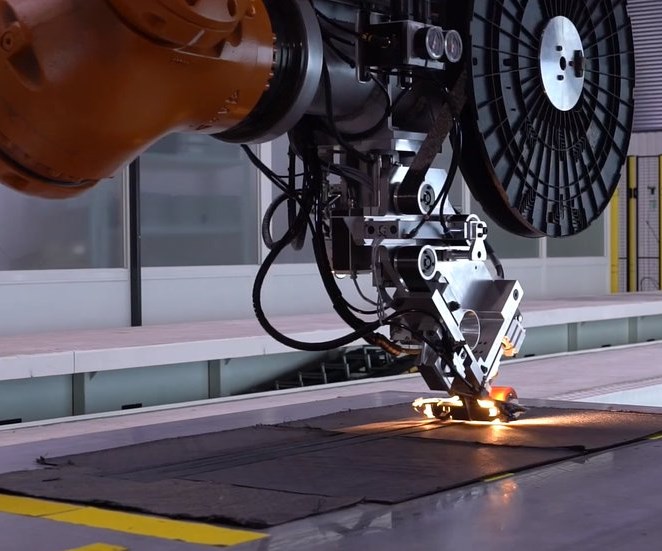IRT Jules Verne, Airbus and Fives launch MADRAS automated textile deposition line for WING project
Goal is full-scale testing of large, complex shape preforms at 5-6 times faster speeds for future aircraft.

The Jules Verne Institute for Technological Research (IRT, Bouguenais, France) has inaugurated the MADRAS automated production line for production of composite textile preforms at rates 5-6 times faster than existing technologies. The 18-meter-long pilot line, installed at the Technocampus Composites (Nantes, France), has been developed in a French national collaboration with Airbus (Toulouse), Fives (Paris) and Loiretech Machining (Bouguenais). It marks a key step in this consortium’s WING project, launched in April 2017.
With a budget of 5.6 million euros, WING aims to assess the ability of textile technology to meet the high production rates for large composite structures with complex geometry for future aircraft. Research areas include preform architecture, tooling concepts and automated production lines. The challenge is to produce such parts at a cost compatible with the economic constraints of the industry.
MADRAS line
The MADRAS pilot line is divided into three robotic stations dedicated to draping, fast preforming and fiber placement. The goal is to eventually reach a deposit rate of 150 kilograms/hour or 300 millimeters/second, and to prove the technical viability of this solution by a series of full-scale tests.
The automated machines developed by Fives must allow fiber reinforcement to be deposited at four times the width and thickness versus current equipment. Loiretech, for its part, has developed specific tools that drastically reduce preforming cycle times. Goals include not only increased production rates for aerospace and industrial sectors, but also reduced production waste, leading to reduced cost and a much improved environmental footprint across industries.
"This technology will interest all industrial sectors who work on small and large parts: traditional and renewable energy, but also the transportation industry overall, whether aerospace, automotive or shipbuilding," explained Marie Weiss, IRT Jules Verne project manager.
For more details, see “With Madras, Airbus and IRT Jules Verne take composites to high speed” by Alexandre Couto at industri-techno.com.
Related Content
-
JEC World 2022, Part 3: Emphasizing emerging markets, thermoplastics and carbon fiber
CW editor-in-chief Jeff Sloan identifies companies exhibiting at JEC World 2022 that are advancing both materials and technologies for the growing AAM, hydrogen, automotive and sustainability markets.
-
Plant tour: AvCarb, Lowell, Mass., U.S.
Composites are often selected for their structural properties, but at AvCarb, innovation in carbon fiber-based products has driven fuel cell technology advances for decades.
-
Hybrid process marries continuous, discontinuous composites design
9T Labs and Purdue applied Additive Fusion Technology to engineer a performance- and cost-competitive aircraft bin pin bracket made from compression-molded continuous and discontinuous CFRTP.















